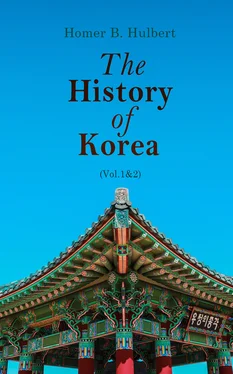Kung-ye was the son of King Hön-gang by a concubine. He was born on the least auspicious day of the year, the fifth of the fifth moon. He had several teeth when he was born which made his arrival the less welcome. The King ordered the child to be destroyed; so it was thrown out of the window. But the nurse rescued it and carried it to a place of safety where she nursed it and provided for its bringing up. As she was carrying the child to this place of safety she accidentally put out one of its eyes. When he reached man’s estate he became a monk under the name of Sŭn-jong. He was by nature ill fitted for the monastic life and soon found himself in the camp of the bandit Ki-whŭn at Chuk-ju. Soon he began to consider himself ill-treated by his new master and deserted him, finding his way later to the camp of the bandit Yang-gil at Puk-wŭn now Wŭn-ju. A considerable number of men accompanied him. Here his talents were better appreciated and he was put in command of a goodly force with which he soon overcame the districts of Ch‘un-ch‘ŭn, Nă-sŭng, Ul-o and O-jin. From this time Kung-ye steadily gained in power until he quite eclipsed his master. Marching into the western part of Sil-la he took ten districts and went into permanent camp.
The following year another robber, Kyŭn-whŭn, made head against Sil-la in the southern part of what is now Kyŭng-sang Province. He was a Sang-ju man. Having seized the district of Mu-ju he proclaimed himself King of Southern Sil-la. His name was originally Yi but when fifteen years of age he had changed it to Kyŭn. He had been connected with the Sil-la army and had risen step by step and made himself extremely useful by his great activity in the field. When, however, the state of Sil-la became so corrupt as to be a by-word among all good men, he threw off his allegiance to her, gathered about him a band of desperate criminals, outlaws and other disaffected persons and began the conquest of the south and west. In a month he had a following of 5,000 men. He found he had gone too far in proclaiming himself King and so modified his title to that of “Master of Men and Horses.” It is said of him that once, while still a small child, his father being busy in the fields and his mother at work behind the house, a tiger came along and the child sucked milk from its udder. This accounted for his wild and fierce nature.
At this time the great scholar Ch‘oé Ch‘i-wŭn, whom we have mentioned, was living at of Pu-sŭng. Recognizing the abyss of depravity into which the state was falling he formulated ten rules for the regulation of the government and sent them to Queen Man. She read and praised them but took no means to put them in force. Ch‘oé could no longer serve a Queen who made light of the counsels of her most worthy subjects and, throwing up his position, retired to Kwang-ju in Nam-san and became a hermit. After that he removed to Ping-san in Kang-ju, then to Ch‘ŭng-yang Monastery in Hyŭp-ju, then to Sang-gye Monastery at Ch‘i-ri San but finally made his permanent home at Ka-ya San where he lived with a few other choice spirits. It was here that he wrote his autobiography in thirteen volumes.
In 896 Kung-ye began operating in the north on a larger scale. He took ten districts near Ch‘ŭl-wŭn and put them in charge of his young lieutenant Wang-gön who was destined to become the founder of a dynasty. We must now retrace our steps in order to tell of the origin of this celebrated man.
Wang-yŭng, a large-minded and ambitious man, lived in the town of Song-ak. To him a son was born in the third year of King Hön-gang of Sil-la, A.D. 878. The night the boy was born a luminous cloud stood above the house and made it as bright as day, so the story runs. The child had a very high forehead and a square chin, and he developed rapidly. His birth had long since been prophesied by a monk named To-sŭn who told Wang-yŭng, as he was building his house, that within its walls a great man would be born. As the monk turned to go Wang-yŭng called him back and received from him a letter which he was ordered to give to the yet unborn child when he should be old enough to read. The contents are unknown but when the boy reached his seventeenth year the same monk reappeared and became his tutor, instructing him especially in the art of war. He showed him also how to obtain aid from the heavenly powers, how to sacrifice to the spirits of mountain and stream so as to propitiate them. Such is the tradition that surrounds the origin of the youth who now in the troubled days of Sil-la found a wide field for the display of his martial skill.
Kung-ye first ravaged the country from Puk-wŭn to A-sil-la, with 600 followers. He there assumed the title of “Great General.” Then he reduced all the country about Nang-ch’ŭn, Han-san, Kwan-nă and Ch‘ŭl-wŭn. By this time his force had enormously increased and his fame had spread far and wide. All the wild tribes beyond the Ta-dong River did obeisance to him. But these successes soon began to turn his head. He styled himself “Prince” and began to appoint prefects to various places. He advanced Wang-gön to a high position and made him governor of Song-do. This he did at the instigation of Wang-yŭng who sent him the following enigmatical advice: “If you want to become King of Cho-sŭn, Suk-sin and Pyön-han you must build a wall about Song-do and make my son governor.” It was immediately done, and in this way Wang-gön was provided with a place for his capital.
In 897 the profligate Queen Man of Sil-la handed the government over to her adopted son Yo and retired. This change gave opportunities on every side for the rebels to ply their trade. Kung-ye forthwith seized thirty more districts north of the Han River and Kyŭn-whŭn established his headquarters at Wan-san, now Chŭn-ju and called his kingdom New Păk-je. Wang-gön, in the name of Kung-ye, seized almost the whole of the territory included in the present provinces of Kyŭng-geui and Ch‘ung-ch‘ŭng. Finally in 901 Kung-ye proclaimed himself king and emphasized it by slashing with a sword the picture of the king of Sil-la which hung in a monastery. Two years later Wang-gön moved southward into what is now Chŭl-la Province and soon came in contact with the forces of Kyŭn-whŭn. In these contests the young Wang-gön was uniformly successful.
In 905 Kung-ye established his capital at Ch‘ŭl-wŭn in the present Kang-wŭn province and named his kingdom Ma-jin and the year was called Mut . Then he distributed the offices among his followers. By this time all the north and east had joined the standards of Kung-ye and Wang-gön even to within 120 miles of the Sil-la capital. The king and court of Sil-la were in despair. There was no army with which to take the field and all they could do was to defend the position they had as best they could and hope that Kyung-ye and Kyŭn-whŭn might destroy each other. In 909 Kung-ye called Sil-la “The Kingdom to be Destroyed” and set Wang-gön as military governor of all the south-west. Here he pursued an active policy, now fitting out ships with which to subjugate the neighboring islands and now leading the attack on Kyŭn-whŭn who always suffered in the event. His army was a model of military precision and order. Volunteers flocked to his standard. He was recognised as the great leader of the day. When, at last, Na-ju fell into the hands of the young Wang-gön, Kyŭn-whŭn decided on a desperate venture and suddenly appearing before that town laid siege to it. After ten days of unsuccessful assault he retired but Wang-gön followed and forced an engagement at Mok-p‘o, now Yŭng-san-p‘o, and gave him such a whipping that he was fain to escape alone and unattended.
Meanwhile Kung-ye’s character was developing. Cruelty and capriciousness became more and more his dominant qualities. Wang-gön never acted more wisely than in keeping as far as possible from the court of his master. His rising fame would have instantly roused the jealousy of Kung-ye.
Читать дальше












